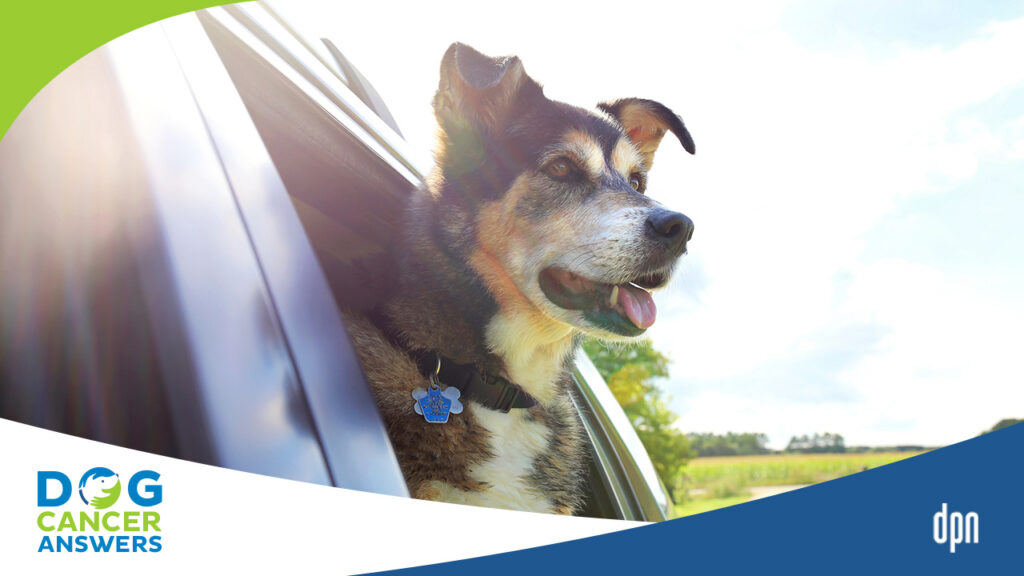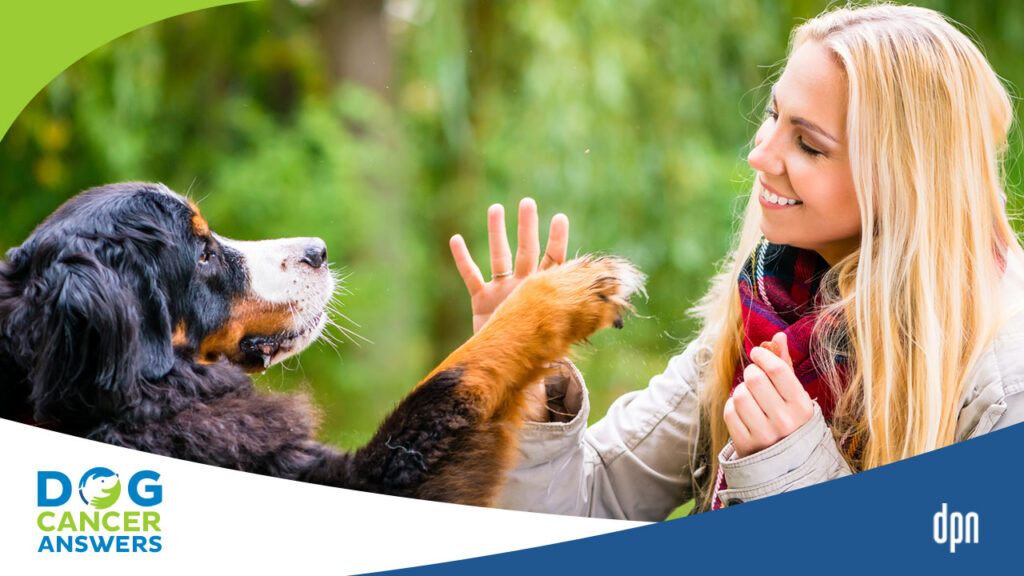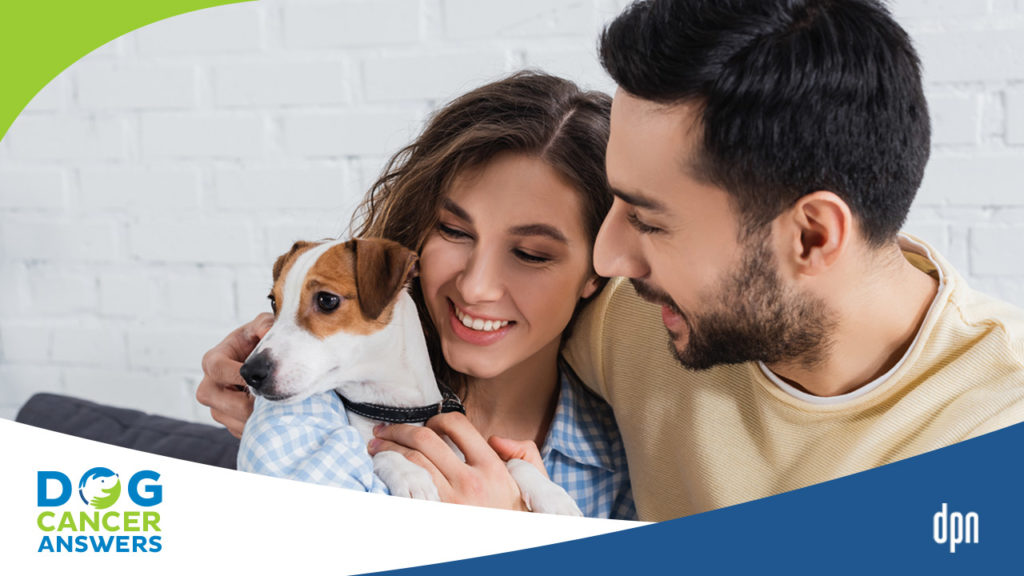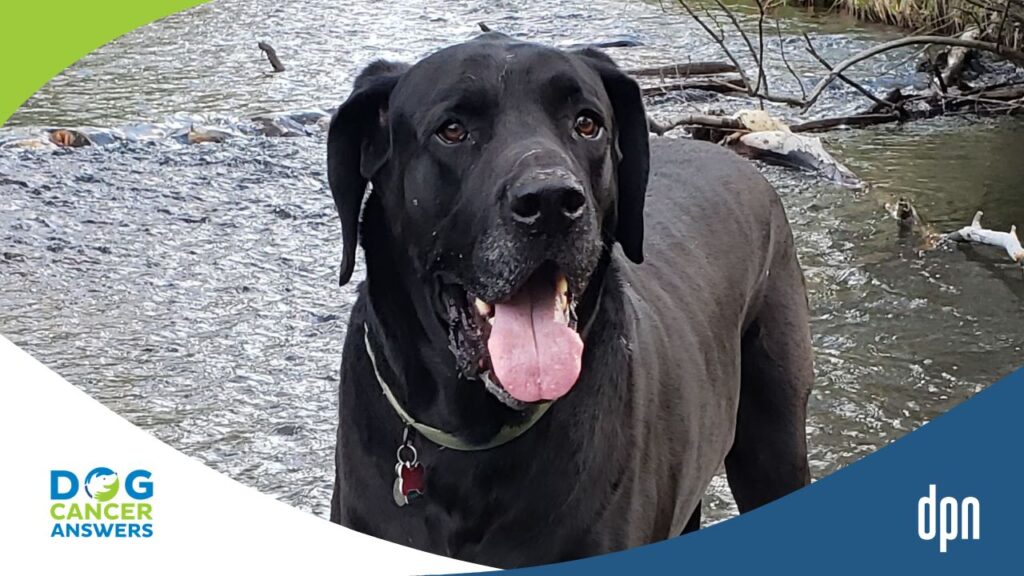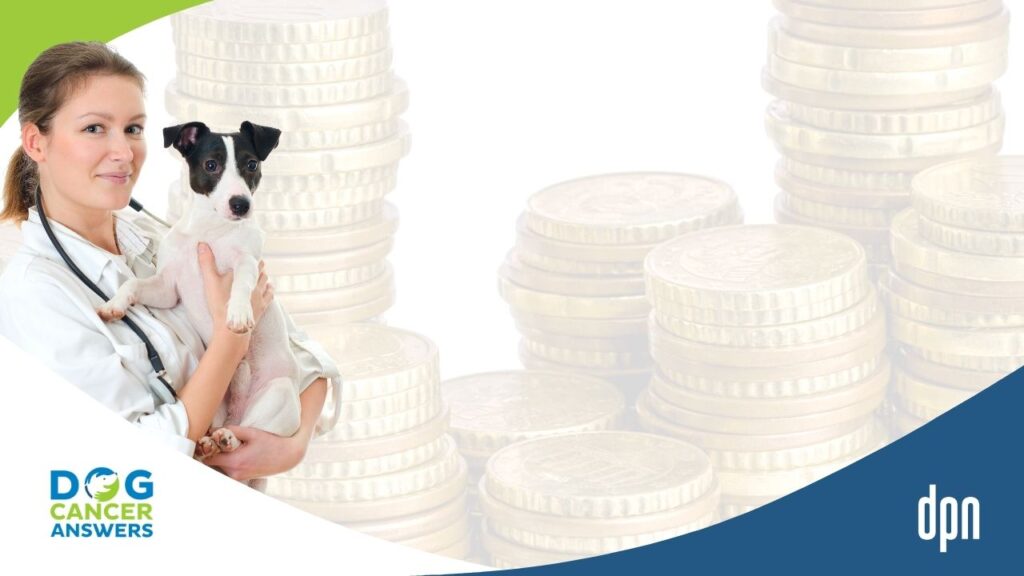EPISODE 245 | RELEASED May 13, 2024
Your Dog Cancer Story | Molly Jacobson
It’s a good idea to get your dog cancer story in alignment with your dog’s cancer story ASAP.
SHOW NOTES
Molly Jacobson, editor-in-chief of DogCancer.com, uses story to explore the emotional and practical aspects of dealing dog cancer. She tells YOUR dog cancer story right alongside YOUR DOG’s cancer story … along the way offering insights into how to navigate your journey with more grace and empathy, while focusing on life quality and the deep connection you share with your dog.
Don’t miss the story at the end about the pediatric oncologist who extended his dog’s life using drive-through cheeseburgers!
The Dog Cancer Survival Guide by Dr. Demian Dressler and Dr. Susan Ettinger: https://dogcancerbook.com/
Join our Facebook support group at https://www.dogcancer.com/support
[00:00:00] >> Molly Jacobson: So your dog has cancer and you wonder what’s going to happen next. Today I’m going to tell you two stories: one is your dog cancer story and the other is your dog’s cancer story.
[00:00:14] >> Announcer: Welcome to Dog Cancer Answers, where we help you help your dog with cancer.
[00:00:20] >> Molly Jacobson: Hi, I’m Molly Jacobson. I’m the Editor-in-Chief at DogCancer.com, where veterinarians, veterinary oncologists, cancer researchers, and science writers all come together to give you better information today, so you have no regrets tomorrow. I’m also the Editor-in-Chief of The Dog Cancer Survival Guide.
[00:00:41] If you’re watching this, I know what you’re going through. Your dog’s probably pretty sick with cancer, and I’ve been there myself. But more importantly, I’ve been there since 2007 talking to watchers and readers and listeners about their own dog cancer stories. I’ve heard tens of thousands of dog cancer stories over the years, and today I’m going to orient you to the dog cancer journey. I can do that for one reason, every dog cancer journey is the same in many, many important ways. The details will vary by person and by dog and by cancer, but almost everybody walks the exact same path.
[00:01:26] Okay, let’s begin your dog cancer story the way many great stories have begun, with a Once Upon a Time. Once upon a time, you went to the veterinarian and you heard the words, your dog has cancer. And the world began to crumble around you. The walls fell, the floor shook under your feet, and all you could see was your dog’s beautiful eyes looking at you while your world fell apart and you were hit with a wall of emotion, you started asking questions, whatever questions first came into your mind, because all you could actually think about was cancer, cancer, cancer.
[00:02:07] And the answers you heard back were mostly some version of, I don’t know, or we don’t know, or we don’t have that information yet. We need to run more tests. What a terrible thing to hear. when you’ve heard the word ‘cancer’ to have the next thing be all about uncertainty, right? Okay, now here’s the beginning to your dog’s cancer story.
[00:02:30] Once upon a time, I went to that place that smells like pee and too many cats, and they poke you and they prod you, and they wouldn’t let my human pet me. They just kept staring at me and staring at me and staring at me, and they started to get like a weird look on their face. And finally, they took me to the back and then there were cages and I didn’t want to go in one of those, so I was just a really, really good dog.
[00:02:55] And then I went out and I stood, yay, next to my human, but for a long time while they did a lot of talking. And then we finally went outside and there were so much pee-mail to read outside, but they wouldn’t let me read it. They just made me get in the car right away.
[00:03:12] Here’s what happens next in your dog cancer story. You pull out your phone and you start to learn an awful lot of things about dog cancer. You find out that 1 out of 2 dogs over the age of 10 get cancer. You find out that 1 out of 3 dogs in general get cancer. You find out that some breeds get cancer and die of it more than any other illness. You find out that cancer is the most common cause of death for dogs outside of shelter euthanasia. You go into shock, because who knew cancer was this big a problem? But the fact remains that your dog has cancer, and that’s the worst thing about dog cancer.
[00:03:55] Now here’s the next part of your dog’s cancer story, I got to stay up all night and cuddle with my human last night and it was so fun because they just pet me the whole night and gave me lots of hugs, but they didn’t get any sleep so this morning they didn’t want to go for a walk because they were too tired.
[00:04:11] Here’s the next part of your story. You start looking for cures, because you want this thing gone. You want your dog’s cancer cured. You want this to have never happened to your dog, and you want it done. So you go looking for cures. And you get a sinking feeling in your gut, because medical professionals, won’t tell you that their treatments are certain cures. And the people who do tell you they have a cure seem a little sketchy and you’re not sure that they’re selling you something that might be too good to be true. And everything you’re finding out about costs money.
[00:04:50] All of it costs money, and some definitely have some side effects you want to avoid and you’re not sure whether your dog can handle them. And not only are you worried this is going to be hard on your dog, you’re worried it’s going to be hard on your wallet. If you’ve got a lot of money, you’re glad about that. You’re glad that you can afford everything that you’re looking at. But you also feel guilty because you know that as much money as you throw at this problem, nobody’s telling you that it’s going to be solved for good.
[00:05:23] And if you don’t have money, and you look at all of these treatments, and they’re stretching you well beyond your wallet, you feel guilty, because here’s yet another thing, that in your dog’s too short life, you’re failing to provide. It’s not fair, because whether you have money or don’t have money, there’s no guarantee that these treatments are going to work for sure, or there’s no guarantees that you can trust. And your dog’s already too short life is being impacted by cancer. So you have shock, and now you have guilt. Fantastic!
[00:06:01] Here’s your dog’s cancer story at this point. My human has been spending days just doing nothing but staring at their phone. I’m starting to think something is really wrong with them. They smell terrible. They are so stressed out. It almost smells like they’re getting sick. I feel like they’re not eating well. They’re not sleeping well. They’re definitely not going out and taking me for a walk and getting exercise for themselves. I really don’t know what to do. I’m kind of getting really worried here. So I’m just going to stay close and I’ll snuggle with them. And I’m just going to try to be here for them during this hard time. I wish I knew what was going on.
[00:06:44] Now let’s move on to the next chapter in your dog cancer story, the one where you make peace with your feelings and start to make treatment decisions. While reading about dog cancer online, hopefully at DogCancer.com, you realize that there are other people in the same boat as you, and you join a support community like ours, at DogCancer.com/support. And you realize quite suddenly you’re not alone.
[00:07:12] You know why? Because when one out of three dogs gets cancer, that means at least one out of three dog lovers are coping with the same thing you’re coping with. With 6 to 10 million cases diagnosed every year in the United States alone, that’s 6 to 10 million fellow dog lovers who are going through something incredibly similar to you.
[00:07:36] So now all of a sudden you have a community. You’re surrounded by people who understand what you’re going through and can offer support to you. And you start to feel like maybe there’s hope because guess what? Dog lovers, like we like to say here, are a breed apart. We’re some of the most wonderful people on the planet. And that means that your new friends are some of the most wonderful people on the planet. As you lurk or share your story or comment on other people’s stories, you start to realize that everyone is afraid.
[00:08:14] Everyone feels guilty. Everyone is ashamed. And everyone is angry. And everyone is feeling a very, very deep existential dread of their dog’s eventual death. We’re all really aware that our dog is going to die. If not today, then some time. That’s something that dog lovers don’t want to think about that much. But those of us whose dogs have cancer, well, we do. So you realize, you’re not alone. You’re a wonderful person, who has a wonderful dog, and that wonderful dog has cancer. But at least you’ve got a pack to travel this journey with.
[00:08:58] Here’s your dog’s cancer story during this time. I feel so much relief because my human really seems to have gotten over the worst of whatever it is that was bothering them. They’re still on their phone all the time, though, and I’m really hoping that they are ready to take a walk soon because it’s been forever!
[00:09:17] Okay, let’s hit pause on Your Dog Cancer Story so we can hear a word from our sponsors, and then I’ll be right back.
[00:09:29] And we’re back with Your Dog Cancer Story and Your Dog’s Cancer Story. And now, the next chapter in your dog cancer story, the chapter where you make choices, you start to make choices, you’ve looked at your budget, you’ve gotten your opinions from your own veterinarian, from veterinary oncologist, if you are able to consult with one, you’ve spoken to maybe holistic veterinarians or integrative veterinarians, or maybe you’re lucky enough to already have a veterinarian who practices integrative medicine, you’ve consulted with people in the group.
[00:10:03] You’ve got some ideas about the things you want to do and what you can do. You’re focused on life quality as your baseline of treatments and everything beyond that that you’re going to try to do with your dog and you’re armed and ready to try something and change if it doesn’t work out as you hope. You’re ready to manage side effects as they come up.
[00:10:26] You’re ready to stop treatments that you don’t like or that don’t work or that don’t give you the results that you’re hoping for. You’re ready to change it up and get focused on your dog’s life quality on a routine basis at home. Again, the details are going to change depending on your dog’s cancer, your dog, yourself, and all of the other factors that go into this.
[00:10:51] But the dog cancer story in general always follows this same pattern. At some point you do reach the point where you have managed to calm down, have enough understanding, you’ve done your crash course on dog cancer, on your dog’s cancer, and you’re ready to start making treatment decisions.
[00:11:10] Okay, I just have to say, sometimes, I don’t want to call him a villain, but sometimes maybe like a controversial character shows up in your dog cancer story at this point. It’s someone, and they might be someone who’s close to you and even loves you and maybe even loves your dog who says, Gosh, I just don’t think we should be spending this time or money or energy on this treatment plan.
[00:11:34] How do you handle that? When somebody asks you, why are you doing this, my suggestion is to say, because I care, I am empathetic, I really want to try, and I know that when I look back later, I won’t regret it. As long as that’s the truth, and you say that to somebody with confidence, that seems to do the trick. No one can really argue with you if you say, I know that I won’t be able to forgive myself if I don’t at least try.
[00:12:10] That, by the way, goes for any decision that you make, no matter what kind of decision it is, as long as you look back on it and you know that you thought about it and you did the best you could know. As long as you’re making the best choice you can in the moment with the information you have at that time, when you look back later, even if later you know new things, you will not regret it.
[00:12:34] And now, having made your decisions and starting your treatments, you go about enjoying your life with your dog, you make a bucket list. You give them the new, interesting, exciting foods that you want to try, whether they’re just toppers on their regular meals or whether you start a whole new diet for them, that’s kind of fun to learn how to feed your dog in a different way.
[00:12:59] You focus on play sessions, maybe you do some training. You meditate with your dog, you go for walks on a routine basis. You focus on living your best life with your dog because that’s the thing that only you can do.
[00:13:16] Your dog’s cancer story continues too. It goes something like this. Oh my god, this is the best time of my entire life. I am eating so many interesting new foods. And you know what? My human keeps giving me these, like, weird shaped pills and bitter tasting medicines, but they always give them to me in something that tastes really yummy, and so that’s fine. I don’t mind. And I get to go to new places. I’ve smelled more new smells in the last two weeks than I’ve smelled in the last two years. This is great. We are always playing, we are always doing things, and I am just loving my life. I love just snuggling with my human, and they seem like they are really, really with me.
[00:14:02] So here’s the next part of your dog cancer story. You notice that your dog seems to be okay even though they have cancer and you realize the two of you might have been living through very different dog cancer stories You know, there’s a perfect story from someone I know that illustrates this. I had the privilege of speaking at long length to a oncologist, a human oncologist who spent decades treating children’s cancer. So he was a pediatric oncologist, and at the end of a very long life, his own dog got cancer.
[00:14:38] And he heard it from the veterinarian. And of course, immediately understood everything about his dog’s cancer diagnosis, and understood the prognosis, and understood that dogs inherently live shorter lives than we do. And so, what normally hits other people like a ton of bricks intellectually and emotionally, he got the emotional stuff. But the intellectual stuff, he walked out knowing exactly what the options were and what he would and wouldn’t do for his dog.
[00:15:05] So he went straight to life quality. He looked at his dog and he thought, What’s something I can do right now on the way home from the veterinarian that my dog will just be thrilled by? And the answer was very clear to him, it was stop at McDonald’s, go through the drive thru, buy something, and then give it to his dog. Because he’d never done that before. His dog had never eaten McDonald’s before.
[00:15:30] And so that’s what he did. He bought a cheeseburger and his dog just was so thrilled and delighted he could see that he was surprised and so excited and it tasted delicious and he was so thankful and he just thought, you know what? For every day that you’re alive and stick around, I am going to make sure that we go to McDonald’s, go through the drive thru, and you get a cheeseburger.
[00:15:58] The veterinarian had told him maybe a matter of weeks, I don’t remember exactly how long, but it turned into a matter of months, and he credits the daily trips to McDonald’s drive thru and those McDonald’s cheeseburgers, this is not an ad for McDonald’s by the way. We’re not sponsored by McDonald’s, but he credited that treat every day that his dog looked forward to it so much. He really thought he stuck around for the food. The food got really great all of a sudden, and his dog was like, I’m staying.
[00:16:30] So I think we should take a cue from a human oncologist who specialized in children’s cancer, and loved his dog, was a wonderful man who has a wonderful dog who had cancer and ended up passing away many, many months after he was diagnosed when he was supposed to only have a couple weeks with no treatments other than McDonald’s cheeseburgers once a day. I think we should take a cue from him.
[00:17:04] I think we should focus on our dog’s life quality. I think that should be the basis of your dog cancer story. And this is where your dog cancer story and your dog’s cancer story merge. Your connection with your dog has survived through the bad news, through all of the confusion, through the emotional purging, through the decision making and through the actual beginning of treatments.
[00:17:33] And it’s survived. That doesn’t always happen. Sometimes we don’t get that chance. And if we do get that chance, I think focusing on that connection is the best way to tell the rest of your dog cancer story, because as I said before, all of the details are going to vary by the cancer type and the dog and you and all of the factors that go into this.
[00:17:59] But as you look at your dog and you realize here they are, they’re right here with me, you don’t lose that connection. And when you maintain that connection through this real trial, you will never ever lose it even after they are gone. They will always be with you in your heart and you will look back with no regrets.
[00:18:18] You know, I have such deep respect and admiration for veterinarians. It’s hard to get into veterinary school. They know so much, they have so many skills, but they don’t have a crystal ball that’s any better than yours or mine. They use a word called prognosis to talk about the likely outcome of illnesses. That word, prognosis, is a Greek word. The literal translation of that word is knowing beforehand. So another word for knowing beforehand is a prediction, or even a prophecy. Or consulting a crystal ball. And I’m sure the veterinarians who are listening would appreciate another way of looking at it, which is what I call a really good educated guess. But in the end, it’s a guess. It’s a guess. So nobody can tell you the ending of your dog cancer story.
[00:18:50] From the moment that you hear the words dog and cancer in the same phrase, and you look at your dog and think that’s what’s going on, from that moment until the end, which does come because once cancer is there, typically, even when treated, that is what ends up being the cause of death.
[00:19:13] And if it isn’t, there’s something else, right? We, none of us get off this planet alive. So something eventually will take your dog, but the beauty, and I believe it’s beautiful from my own experience, but also from the experiences of so many people who’ve told me their story over the years, the beauty of dog cancer is that it wakes us up to how deep our connection is to our dogs.
[00:19:39] And it wakes us up to how much we love them. And then that love that we share with them opens us up to some dimension inside of ourselves, or it can, the opportunity is there to connect with our dog deeply and let our dog bring out the best parts of ourselves, because dogs and humans have evolved together. The two species are intertwined.
[00:20:06] We like to say that dogs evolved to be with humans, but the truth is the opposite is also true. Humans evolved to be with dogs. As species, we are best friends, and we have been companions for 35,000 years. And cancer, is one of our oldest diseases. Thousands and thousands and thousands of years ago, doctors in antiquity were writing about cancer and how difficult it is to treat. It’s been around for a really long time.
[00:20:39] Something about cancer is part of our experience as humans, and it’s part of the dog’s experience as well. It’s something that we share. I don’t like it, and I want a cure for it. But while it’s still here, and while we are experiencing it, I think it’s got something to share with us. And what I think it is, is that it brings out the best dog in every human.
[00:21:06] And that’s the end of every dog cancer story in my mind is that it changes us, it allows us to become more open, more heart centered, more vulnerable, and more understanding and empathetic. At least, that’s the happy ending that I always look for in a dog cancer story, and it’s my happy ending to my dog cancer story.
[00:21:33] So as you write your dog cancer story with your dog, make sure that you’re focused more on their dog cancer story than on your own. Your own is filled with all sorts of things that are kind of boring, like, I don’t know, decisions about what treatments to make. Theirs is very exciting and involves things like fresh air and smells in the grass and butterflies and rain. Those are much more important things to pay attention to. So as you write your story, remember to look at your dog’s cancer story first and center that as your governing narrative. Don’t get sidetracked because you are in charge of this story.
[00:22:16] Thanks for listening today. I hope this served you. If you have your own dog cancer story to tell, please go to DogCancer.com/ask. Don’t forget to subscribe to our podcast wherever it is that you listen. And from all of us here at Dog Podcast Network, I’m Molly Jacobson wishing you and your dog a very warm Aloha.
[00:22:45] >> Announcer: Thank you for listening to Dog Cancer Answers. If you’d like to connect, please visit our website at DogCancer.com or call our listener line at (808) 868-3200. And here’s a friendly reminder that you probably already know, this podcast is provided for informational and educational purposes only. It’s not meant to take the place of the advice you receive from your dog’s veterinarian.
[00:23:08] Only veterinarians who examine your dog can give you veterinary advice or diagnose your dog’s medical condition. Your reliance on the information you hear on this podcast is solely at your own risk. If your dog has a specific health problem, contact your veterinarian. Also, please keep in mind that veterinary information can change rapidly, therefore, some information may be out of date.
[00:23:28] Dog Cancer Answers is a presentation of Maui Media in association with Dog Podcast Network.
SUBSCRIBE ON YOUR FAVORITE PLATFORM
Topics
Editor's Picks
CATEGORY

